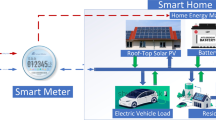Abstract
In the present scenario, the utilities are focusing on smart grid technologies to achieve reliable and profitable grid operation. Demand side management (DSM) is one of such smart grid technologies which motivate end users to actively participate in the electricity market by providing incentives. Consumers are expected to respond (demand response (DR)) in various ways to attain these benefits. Nowadays, residential consumers are interested in energy storage devices such as battery to reduce power consumption from the utility during peak intervals. In this paper, the use of a smart residential energy management system (SREMS) is demonstrated at the consumer premises to reduce the total electricity bill by optimally time scheduling the operation of household appliances. Further, the SREMS effectively utilizes the battery by scheduling the mode of operation of the battery (charging/floating/discharging) and the amount of power exchange from the battery while considering the variations in consumer demand and utility parameters such as electricity price and consumer consumption limit (CCL). The SREMS framework is implemented in Matlab and the case study results show significant yields for the end user.
Similar content being viewed by others
References
Fang X, Misra S, Xue G, Yang D. Smart grid—the new and improved power grid: a survey. IEEE Communications Surveys and Tutorials, 2012, 14(4): 944–980
Esther B P, Kumar K S. A survey on residential demand side management architecture, approaches, optimization models and methods. Renewable & Sustainable Energy Reviews, 2016, 59: 342–351
Strbac G. Demand side management: benefits and challenges. Energy Policy, 2008, 36(12): 4419–4426
Palensky P, Dietrich D. Demand side management: demand response, intelligent energy systems, and smart loads. IEEE Transactions on Industrial Informatics, 2011, 7(3): 381–388
Mohsenian-Rad A H, Leon-Garcia A. Optimal residential load control with price prediction in real-time electricity pricing environments. IEEE Transactions on Smart Grid, 2010, 1(2): 120–133
Centolella P. The integration of price responsive demand into regional transmission organization (RTO) wholesale power markets and system operations. Energy, 2010, 35(4): 1568–1574
Costanzo G T, Zhu G, Anjos M F, Savard G. A system architecture for autonomous demand side load management in smart buildings. IEEE Transactions on Smart Grid, 2012, 3(4): 2157–2165
Conejo A J, Morales J M, Baringo L. Real-time demand response model. IEEE Transactions on Smart Grid, 2010, 1(3): 236–242
Pradhan V, Murthy Balijepalli V S K, Khaparde S A. An effective model for demand response management systems of residential electricity consumers. IEEE Systems Journal, 2016, 10(2): 434–445
Setlhaolo D, Xia X. Optimal scheduling of household appliances with a battery storage system and coordination. Energy and Building, 2015, 94: 61–70
Ratnam E L, Weller S R, Kellett C M. Scheduling residential battery storage with solar PV: assessing the benefits of net metering. Applied Energy, 2015, 155: 881–891
Gottwalt S, Ketter W, Block C, Collins J, Weinhardt C. Demand side management—a simulation of household behavior under variable prices. Energy Policy, 2011, 39(12): 8163–8174
Hubert T, Grijalva S. Modeling for residential electricity optimization in dynamic pricing environments. IEEE Transactions on Smart Grid, 2012, 3(4): 2224–2231
Chen X, Wei T, Hu S. Uncertainty-aware household appliance scheduling considering dynamic electricity pricing in smart home. IEEE Transactions on Smart Grid, 2013, 4(2): 932–941
Pipattanasomporn M, Kuzlu M, Rahman S. An algorithm for intelligent home energy management and demand response analysis. IEEE Transactions on Smart Grid, 2012, 3(4): 2166–2173
Setlhaolo D, Xia X, Zhang J. Optimal scheduling of household appliances for demand response. Electric Power Systems Research, 2014, 116: 24–28
Chen H, Cong T N, Yang W, Tan C, Li Y, Ding Y. Progress in electrical energy storage system: a critical review. Progress in Natural Science, 2009, 19(3): 291–312
Purvins A, Papaioannou I T, Debarberis L. Application of batterybased storage systems in household-demand smoothening in electricity-distribution grids. Energy Conversion and Management, 2013, 65: 272–284
Leadbetter J, Swan L. Battery storage system for residential electricity peak demand shaving. Energy and Building, 2012, 55: 685–692
Saravanan B. DSM in an area consisting of residential, commercial and industrial load in smart grid. Frontiers in Energy, 2015, 9(2): 211–216
Muratori M, Rizzoni G. Residential demand response: dynamic energy management and time-varying electricity pricing. IEEE Transactions on Power Systems, 2016, 31(2): 1108–1117
Elsayed A T, Lashway C R, Mohammed O A. Advanced battery management and diagnostic system for smart grid infrastructure. IEEE Transactions on Smart Grid, 2016, 7(2): 897–905
Aktas A, Erhan K, Ozdemir S, Ozdemir E. Experimental investigation of a new smart energy management algorithm for a hybrid energy storage system in smart grid applications. Electric Power Systems Research, 2017, 144: 185–196
Belfkira R, Zhang L, Barakat G. Optimal sizing study of hybrid wind/PV/diesel power generation unit. Solar Energy, 2011, 85(1): 100–110
Huang D, Zareipour H, Rosehart W D, Amjady N. Data mining for electricity price classification and the application to demand-side management. IEEE Transactions on Smart Grid, 2012, 3(2): 808–817
Fan S, Mao C, Chen L. Next-day electricity-price forecasting using a hybrid network. IET Generation, Transmission & Distribution, 2007, 1(1): 176–182
Acknowledgements
This publication is an outcome of the R&D work undertaken in the project under the Visvesvaraya Ph. D Scheme of Ministry of Electronics & Information Technology, Government of India, being implemented by Digital India Corporation (formerly Media Lab Asia).
Author information
Authors and Affiliations
Corresponding author
Rights and permissions
About this article
Cite this article
Arun, S.L., Selvan, M.P. Smart residential energy management system for demand response in buildings with energy storage devices. Front. Energy 13, 715–730 (2019). https://doi.org/10.1007/s11708-018-0538-2
Received:
Accepted:
Published:
Issue Date:
DOI: https://doi.org/10.1007/s11708-018-0538-2




